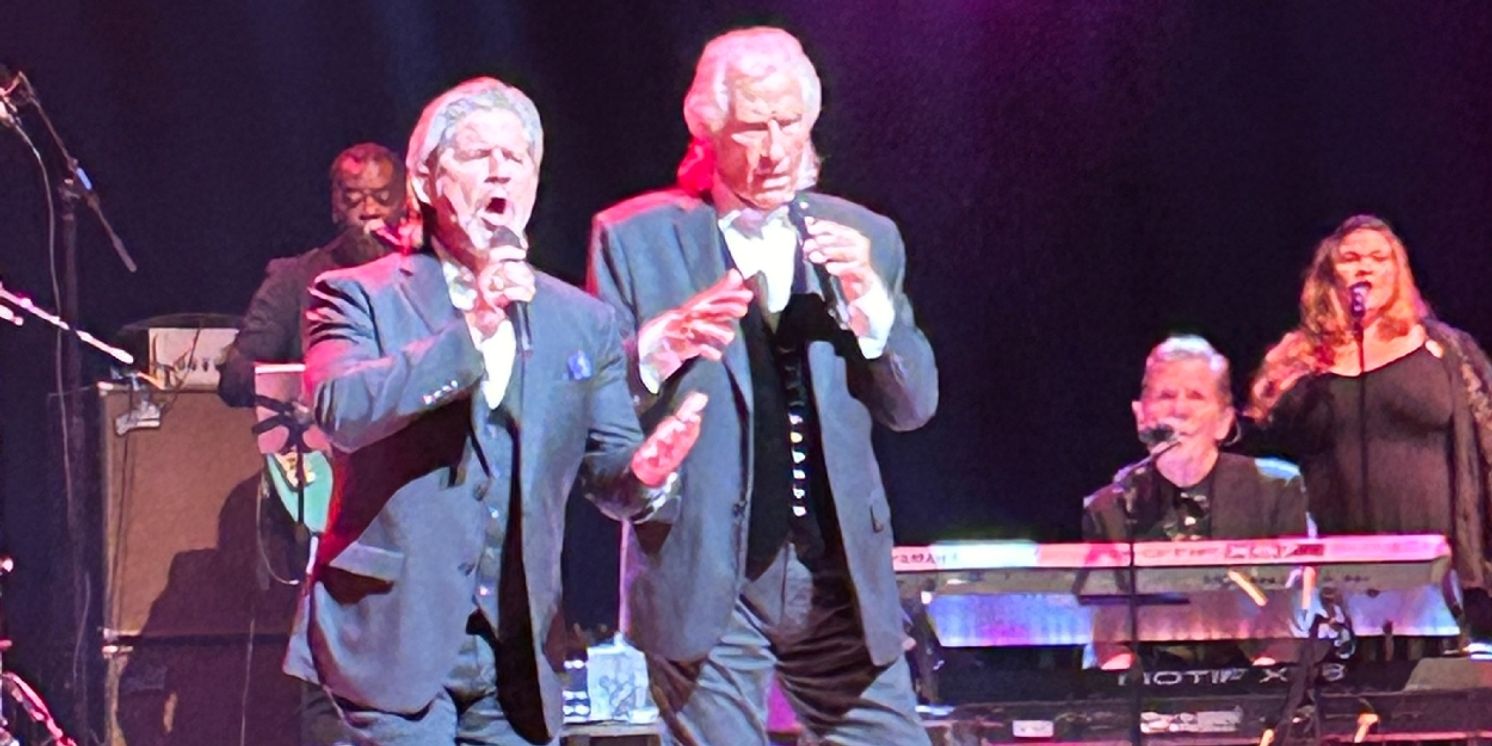Review: THE RIGHTEOUS BROTHERS FAREWELL TOUR at Strathmore
Retooled duo bring the hits in Strathmore performance.

The latest Righteous Brothers farewell tour pulled into the Strathmore in Bethesda Thursday, entertaining an elderly crowd who enjoyed hearing their hits from the 1960s.
The act had said farewell a few times in the past six decades — in 1968 for six years, again in 1976 for five years, and with some finality when the duo’s Bobby Hatfield died in 2003 just before a concert in Kalamazoo.
Remaining member Bill Medley, who’d had a few hits as a solo artist, never thought he’d resurrect the duo name until he saw Bucky Heard, a former performer on cruise ships and in Branson, sing a Journey song in a Legends revue in Vegas. The younger man had the tenor range that could make the Righteous Brothers happen again. And since 2016, they’ve been doing so.
By now, its act is pretty well set, and as much as Medley likes to act like he’s taking odd turns or laconically ad-libbing, it’s likely a more professional delivery from decades of doing this.
Two years older than President Biden, Medley at 83 is still a rangey fellow, with his white hair swept back in a kind of old preacher mullet. What’s odd is that Heard, born in the year of the Righteous Brothers' commercial height, 1965, didn’t look out of place. He has the shorter stature of Hatfield, and a greying beard at 59 that doesn’t it make it look too much like a father-son act.
The great thing about being a singer this seasoned, is that it doesn’t take nearly as much toll on a bass-baritone, so Medley can still hit those basement notes that signal the start of such great classics as “You’ve Lost That Lovin’ Feelin’” — which they saved as a natural to close the show.
The Righteous Brothers began life in the as a lively, harmonizing R&B act during the Kennedy administration. And there were some signs of those upbeat beginnings in the show, from Medley’s own composition, “Little Latin Lupe Lu” — performed slightly slower than it would be done by Mitch Ryder and Bruce Springsteen — and what he called Elvis’ favorite Righteous Brothers song, “My Babe.”
And while such material would serve the two well as they became something of a fixture on 60s TV shows like "Shindig!" and opening U.S. tours for the Beatles and The Rolling Stones, they'd rise to the top with the impeccably produced, dynamic ballads produced by Phil Spector in 1964.
In addition to the peerless “Loving Feelin’” written by Barry Mann and Cynthia Weil, the string of stirring hits included its 1965 follow-up, “Just Once in My Life,” written by Gerry Goffin and Carole King, and a second Mann-Weill chart topper, “(You’re My) Soul and Inspiration” both performed quite early in the set.
Whereas the Spector singles famously featured dozens of musicians to build his producer's famed wall of sound (with the Blossoms, the Rosettes and Cher all among the backup singers for “Lovin’ Feelin’”), here the act was backed by a mere four-piece band, plus two horns and two backup singers, which still worked pretty well.
The last Righteous Brothers hit in the Top 5 — 1974's “Rock and Roll Heaven” — came smoothly early in the set, too, adding Hatfield to those who they memorialized in the original single — Jimi Hendrix, Janis Joplin, Otis Redding and Jim Morrison, among them.
Hatfield’s legacy was mentioned so often you almost felt bad for the fill-in. And though he came close to Hatfield’s heights in those songs, Heard wasn’t tapped to do his solo standout, “Unchained Melody.” Instead, Medley did a slower, lower-key version as slides of Hatfield were shown on a screen (and the band turned reverently to face them). It was still an affecting way to wrench some emotion from the song, which rose again in prominence in the film “Ghost,” and was likely something Medley had worked up as a tribute for his solo act where it worked well enough that he kept in the current partnership.
Medley had his own movie-related hit to share, “(I’ve Had) The Time of My Life” from “Dirty Dancing,” which he sang with one of the backup singers who happened to be his daughter, Mckenna Medley. She’d come front and center to do her own solo, a slowed-down version of the Mamas and the Papas’ hit “California Dreamin,’” that showed her to have one of the best voices on the stage.
With Righteous Brothers hits running low, there was a little space-filling here and there. Heard got the solo spotlight to sing “Somewhere” from “West Side Story” as well as Roy Orbison’s “Crying” and Puccini’s “Nessun dorma,” neither of which are the easiest song to pull off, but he did as kind of a show-off thing.
Medley got another solo spot, to do a song from a solo blues album released 20 years ago.
But the two combined to cover some soul songs that the original recording duo did, Sam & Dave’s “Soul Man” to start, and the Coasters’ “Young Blood” to the tiniest bit of Little Richard’s “Tutti Fruitti.”
A better band flashback came when they performed one of the gospel songs they used to do, the surprisingly jaunty Judgment Day spiritual “In That Great Gettin’ Up Mornin,’” augmented by all the other voices on stage.
But their maudlin pairing of “Bridge Over Troubled Water” with “Lean On Me” as a patriotic salute to veterans was straight out of the Branson playbook.
At the end, preparing for the concluding “Lovin’ Feelin,'” they marveled that it had almost been a decade of their pairing. There was certainly no mention of a farewell.
Reader Reviews
Videos

